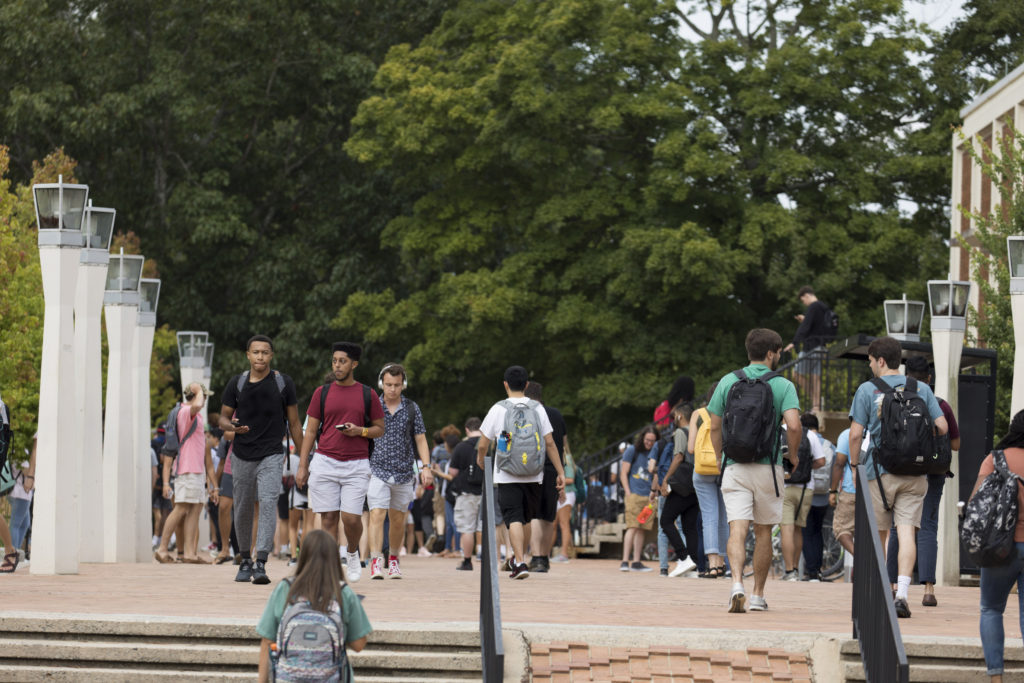Over the past year, University of Georgia students, faculty and staff fanned across the state to help recruit historically underrepresented and first-generation students to the birthplace of public higher education. On campus, new programs were launched to promote the academic success of students from rural areas and to broaden the pipeline of students pursuing advanced STEM degrees.
These efforts, among many others, have been recognized at a national level through the 2018 INSIGHT Into Diversity Higher Education Excellence in Diversity Award. The HEED Award is the only national recognition honoring colleges and universities that exhibit outstanding efforts and success in the area of diversity and inclusion, and 2018 marks the fifth consecutive year that UGA has been honored.
“I am proud that the University of Georgia has been recognized nationally for the fifth consecutive year with the HEED Award,” said President Jere W. Morehead. “A diverse and welcoming environment strengthens a university in innumerable ways, and I am grateful to our faculty, staff and students for their ongoing commitment to fostering a more inclusive community.”
Recruiting diverse students
Creating awareness of the opportunities that higher education provides, the application process and scholarships is the goal of the university’s precollegiate programs, which reach students as early as middle school and include Gear Up for College and Road to UGA. Through a program known as Road Dawgs—a partnership among the Office of the President, Office of Admissions and the Office of Institutional Diversity—UGA students volunteer their spring break to visit high schools to discuss college preparation and their experiences at UGA. In addition, programs such as Georgia Daze, Movimiento Latino and the Georgia African American Male Experience bring prospective students to campus to meet with students and faculty.
Road Dawgs visiting Atlanta area schools. (Photo by Dorothy Kozlowski)
The university’s recruitment efforts extend across the state and also include Athens-Clarke County, where the Experience UGA partnership brings students enrolled in Clarke County schools to campus for hands-on learning opportunities. UGA recently partnered again with the Clarke County School District to launch a leadership development and college readiness program for high school students known as Georgia Possible.
Personalized support and programs
Once on campus, students receive personalized support through programs such as ALL Georgia, which was launched this year to provide students from rural areas of the state with a set of experiences that facilitate adjustment to college life and lay the foundation for academic success. The ALL Georgia Scholarship program was launched this year, as well, to provide financial aid to outstanding students from rural areas.
Since January 2017, UGA donors have created more than 280 need-based scholarships through the Georgia Commitment Scholarship program, through which the UGA Foundation will match—dollar for dollar—individual donations of $50,000, $75,000 and $100,000 to double the impact of these endowed need-based scholarships.
New Approaches to Promote Diversity and Inclusion grants, an initiative of the President’s Office, have funded 21 programs in units across campus, including career mentoring and targeted efforts in fields such as law, pharmacy, veterinary medicine and engineering.
“The enthusiasm with which members of the campus community embrace diversity in its many forms is inspiring,” said Michelle Cook, vice provost for diversity and inclusion and strategic university initiatives. “There is a real understanding that each of us plays a role in making this university the very best that it can be.”
To foster diversity in the STEM fields, UGA leads the Peach State Louis Stokes Alliance for Minority Participation, which is funded by the National Science Foundation and includes five additional universities across the state. Through a high school bridge program, summer research program and mentoring, the Peach State LSAMP has significantly increased the number of underrepresented minority students in STEM fields at UGA.
At the post-baccalaureate level, longstanding programs such the National Institutes of Health-funded PREP@UGA provide focused research training opportunities for students from underrepresented backgrounds. New funding from the NSF has enabled UGA to partner with five other universities to form the National Alliance for Inclusive and Diverse STEM Faculty. Programs such as these have helped make UGA the nation’s top public flagship university for the number of doctoral degrees it awards to African Americans.
Faculty and staff demonstrate their commitment to creating a campus climate that values and respects difference through their voluntary participation in the university’s Certificate for Diversity and Inclusion program. Since the program was launched in 2012, nearly 5,000 faculty and staff members have participated.
In addition, the university’s Office of Faculty Affairs delivers trainings for department heads and search committees on attracting a diverse hiring pool, and programs such as the Women’s Leadership Fellows Program support the career development of faculty members.
“Learning, discovery and creativity thrive in an environment that celebrates diversity,” said Interim Senior Vice President for Academic Affairs and Provost Libby V. Morris. “I am deeply grateful to our outstanding students, faculty and staff for fostering the sense of inclusion and shared commitment that defines the University of Georgia.”
